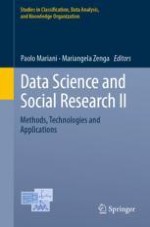2021 | OriginalPaper | Buchkapitel
Social Epidemiology: The Challenges and Opportunities of Worldwide Data Consortia
verfasst von : Carlotta Galeone, Rossella Bonzi, Federica Turati, Claudio Pelucchi, Matteo Rota, Carlo La Vecchia
Erschienen in: Data Science and Social Research II
Aktivieren Sie unsere intelligente Suche, um passende Fachinhalte oder Patente zu finden.
Wählen Sie Textabschnitte aus um mit Künstlicher Intelligenz passenden Patente zu finden. powered by
Markieren Sie Textabschnitte, um KI-gestützt weitere passende Inhalte zu finden. powered by
